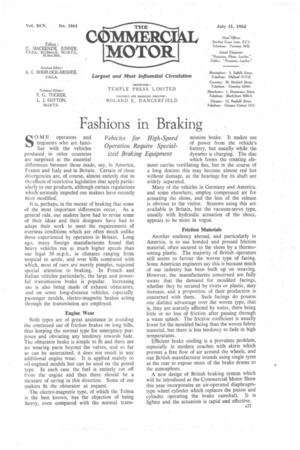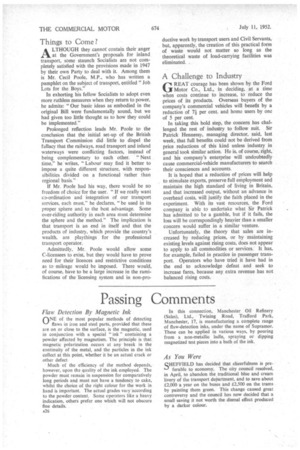Fashions in Braking
Page 27

Page 28

If you've noticed an error in this article please click here to report it so we can fix it.
SOME operators and engineers who are fami liar with the vehicles produced in other countries are surprised at the essential differences between those made, say, in America, France and Italy and in Britain. Certain of these divergencies are, of course, almost entirely due to the effects of restrictive legislation that apply particularly to our products, although certain regulations which seriously impeded our makers have recently been modified.
It is, perhaps, in the matter of braking that some of the most important differences occur. As a general rule, our makers have had to revise some of their ideas and their designers have had to adapt their work to meet the requirements of overseas conditions which are often much unlike those experienced by operators in Britain. Long ago, many foreign manufacturers found that heavy vehicles run at much higher speeds than our legal 30 m.p.h., in climates ranging from. tropical to arctic, and over hills compared with which, most of ours are merely pimples, required special attention to braking. In French and Italian vehicles particularly, the large and powerful transmission brake is popular. Increasing use is also being made of exhaust obturators, and on some long-distance vehicles, especially passenger models, electro-magnetic brakes acting through the transmission are employed.
Engine Wear Both types are of great assistance in avoiding the continued useof friction brakes on long hills, thus keeping the normal type for emergency purposes and obviating any tendency towards fade. The obturator brake is simple to fit and there are no wearing parts beyond the valves, and so far as can be ascertained, it does not result in any additional engine. wear. It is applied mainly to oil-engined models but can be used on the petrol type. In each case the fuel is entirely cut off from the engine and thus there should be a measure of saving in this direction. Some of our makers fit the obturator at request.
The electro-magnetic type, of which the Telma is the best known, has the objection of being heavy, even compared with the normal trans mission brake. It makes use of power from the vehicle's battery, but usually while the dynamo is charging. The disc which forms the rotating element carries ventilating fins, but in the course of a long descent this may become almost red hot without damage, as the bearings for its shaft are widely separated.
Many of the vehicles in Germany and America, and some elsewhere, employ compressed air for actuating the shoes, and the hiss of the release is obvious to the visitor. Systems using this are available in Britain, but the vacuum-servo type, usually with hydraulic actuation of the shoes, appears to be more in vogue.
Friction Materials Another tendency abroad, and particularly in America, is. to use bonded and pressed friction material, often secured to the shoes by a thermosetting plastic. The majority of British operators still seems to favour the woven type of facing. Some American engineers say this is because much of our industry has been built up on weaving. However, the manufacturers concerned are fully aware that the demand for moulded facings, whether they be secured by rivets or plastic, may increase, and a proportion of their production is concerned with them. Such facings do possess one distinct advantage over the woven type, that is, they are scarcely affected by water, there being little or no loss of friction after passing through a water splash: The friction coefficient is usually lower for the moulded facing than the woven fabric material, but there is less tendency to fade at high temperatures. Efficient brake cooling is a prevalent problem, especially in modern coaches with skirts which prevent a free flow of air around the wheels, and one British manufacturer intends using single tyres at the rear to expose more of the brake drums to the atmosphere. A new design of British braking system which will be introduced at the Commercial Motor Show this year incorporates an air-operated diaphragmtype wheel cylinder which replaces the piston and cylinder operating the brake camshaft. It is lighter and the actuation is rapid and effective.
Things to Come? Things to Come?
ALTHOUGH they cannot' contain their anger at the Government's proposals for inland transport, some staunch Socialists are not completely satisfied with the provisions made in 1947 by their own Party to deal with it. Among them is Mr. Cecil Poole, M.P., who has written a pamphlet on the subject of transport, entitled "Job Lots for the Boys."
In exhorting his fellow Socialists to adopt even more ruthless measures when they return to power, he admits: "Our basic ideas as embodied in the original Bill were fundamentally sound, but we had given too little thought as to how they could be implemented."
Prolonged reflection leads Mr. Poole to the conclusion that the initial set-up of the British Traniport Commission did little to dispel the fallacy that the railways, road transport and inland waterways were conflicting factors, instead of being complementary to each other. "Next time," he writes, "Labour may find it better to impose a quite different structure, with responsibilities divided on a functional rather than regional basis."
If Mr. Poole had his way, there would be no freedom of choice for the user. " If we really want co-ordination and integration of our transport services, each must." he declares, "be used in its proper sphere and to the best advantage. Some over-riding authority in each area must determine the sphere and the method." The implication is that transport is an end in itself and that the products of industry, which provide the country's wealth, are playthings for the professional transport operator.
Admittedly, Mr. Poole would allow some C-licensees to exist, but they would have to prove need for their licences and restrictive conditions as to mileage would be imposed. There would, of course, have to be a large increase in the ramifications of the licensing system and in non-pro. ductive work by transport users and Civil Servants, but, apparently, the creation of this practical form of waste would not matter so long as the theoretical waste of load-carrying facilities was eliminated. .
A Challenge to Industry
GREAT courage has been shown by the Ford Motor Co., Ltd., in deciding, at a time when costs continue to increase, to reduce the prices of its products. Overseas buyers of the company's commercial vehicles will benefit by a reduction of 71per cent. and home users by one of 5 per cent.
In taking this bold step, the concern has challenged the rest of industry to follow suit. Sir Patrick Hennessy, managing director, said, last week, that full benefits could not be derived from price reductions of this kind unless industry in general took similar action. He is, of course, right, and his company's enterprise will undoubtedly cause commercial-vehicle manufacturers to search their consciences and accounts.
It is hoped that a reduction of prices will help to stimulate exports, preserve full employment and maintain the high standard of living in Britain, and that increased output, without an advance in overhead costs, will justify the faith placed in the experiment. With its vast resources, the Ford company is able to undertake what Sir Patrick has admitted to be a gamble, but if it fails, the loss will be correspondingly heavier than a smaller concern would suffer in a similar venture.
Unfortunately, the theory that sales are increased by reducing prices, or by maintaining existing levels against rising costs, does not appear to apply to all commodities or services. It has. for example, failed in practice in passenger transport. Operators who have tried it have had in the end to acknowledge defeat and seek to increase fares, because any, extra revenue has not balanced rising costs.




















































































